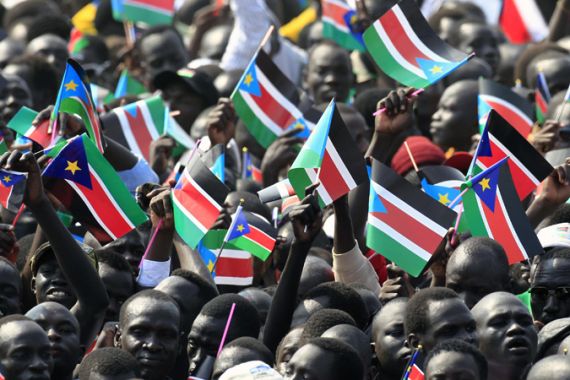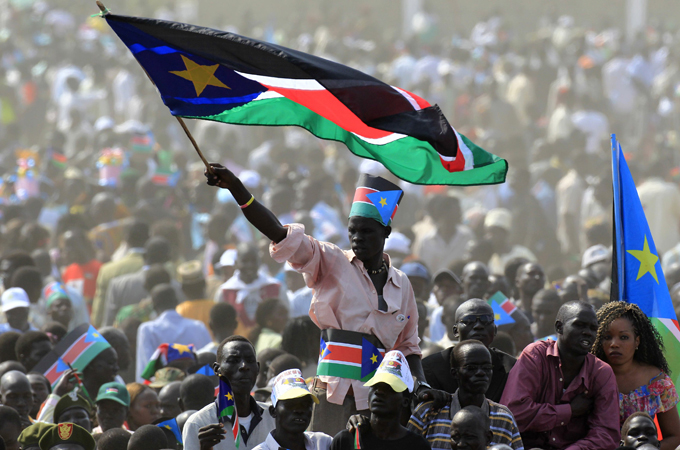Sudan split was ‘over-simplified’ by media
Division of Africa’s largest country may be result of a “Sudanese identity crisis” sparked by Khartoum-led power grab.

 |
| Tens of thousands of citizens of the new South Sudan celebrated national independence on July 9 – but whether statehood will resolve issues of identity after a decades-long war remains to be seen [REUTERS] |
For many directly affected by the world’s longest-running civil war, the Sudanese conflict has been over-simplified in the Western press as inter-religious or inter-ethnic strife.
“The media tried to make us look like Jafar in Aladdin,” says Khalid Albaih, a Sudanese political cartoonist. “Everyone looks alike [in Sudan], the Arabs and the Africans,” he adds.
John Prendergast, human rights activist and co-founder of the Enough project, told Al Jazeera: “One should not overplay this idea of north versus south or Christian versus Muslim.” While Moez Ali, a Sudanese blogger and political commentator, said the conflict was an issue of disenfranchisement of a people “who were never given an agenda in the government” throughout the nation’s 55-year history.
Since independence in 1956, “a small group of people in power in Khartoum used race and religion to divide and conquer,” says Prendergast. This conflict was further exacerbated in 2004 when the Khartoum government, headed by Omar al-Bashir, made a bid to control the oil and water resources of the south, he adds.
These divisions created by leaders “who have failed to understand the multi-ethnicity and multi-culturalism of the nation since independence,” resulted in the division of what was Africa’s largest country, says Khartoum-based web developer Usamah Ali.
Identity crisis
The ongoing state-sponsored exclusionist cultural and social division has led to what Usamah Ali, based in Sudan for the past ten years, refers to as “the Sudanese identity crisis”. “There has been this constant questioning of ‘are we Arab?’ ‘Are we African?’ ‘Or are we a hybrid of both?'” he says.
This division of the north and south is “the legacy of British imperialism – they did it in the Indian subcontinent; they did it with Iran and Iraq”, says Albaih, whose father served as ambassador to Romania – until current President Omar al-Bashir came to power in a bloodless coup in 1989.
Sudanese-born writer and commentator for The Guardian, Nesrine Malik, says this legacy extended to British “laziness and disinterest” in southern engagement during independence talks. However, several people in interviews with Al Jazeera stated that what brief window existed for integrating the two peoples was quickly squandered by successive governments in Khartoum.
“I could easily blame British imperialism, but the truth is the northern government never did enough to integrate the two people,” says blogger Moez Ali. Prendergast agrees: “Khartoum did nothing for the south. They didn’t use their massive oil revenues to build infrastructure.”
The resulting situation has become one in which the south has remained “an entity that never really latched onto the northern mother ship”, says Malik. Furthering the divide between the north and the south was President Omar al-Bashir’s imposition of hardline Islamist stances in the early 1990s. For the largely Christian and animist southerners, Malik says al-Bashir’s push for an Arab Islamist identity in Sudan “was a bridge too far”.
Pendergast, who has been in and out of the North African country since the 1980s, says this Arab-Islamist identity used by Khartoum as “the only acceptable identity for Sudan” was unacceptable for “large swathes of people, not just in the south”.
The ongoing battles in Kordofan and Darfur were, in part, a result of Muslims rejecting Arab dominance, says Usamah Ali. In rejecting Arab dominance over their Islamic faith, Usamah Ali says many people in the north were making a statement that “we can be Muslim and African”. Add to all this a lack of northern political interest in the south wherein “the Khartoum government never sought southern trust by giving them equitable resources”. Prendergast concludes that the result is a population “that had a historical case and tremendous grievances” against the northern government. “Why would southerners stay?” asks Prendergast. In February, the final outcome of these exclusionist policies was delivered in a vote by 98.83 per cent of southerners for independence.
The economy is key
For a northern population that has been largely defined in opposition to the south, July 9 will not have marked the end of their identity crisis. Instead, it will have forced them to construct a new northern identity while also trying to address major political and economic issues, say analysts.
“This is the north’s day of reckoning,” says Malik. “How to make the north a viable state for the first time.” For Albaih, the day of southern independence meant an end to northern excuses. Albaih referred to a speech made by al-Bashir in 2004, in which the president stated outright: “There would be no more military spending” following the comprehensive peace agreement. Now, Albaih says, “they should be putting that money into education and infrastructure.” At an estimated cost of $2 million per day of war, Malik says, “the economy is the key for the north”.
The role of the United States, which has been largely supportive of the world’s newest state, is seen as essential to any future chance of Khartoum’s success. Khartoum’s desire to get out from under US sanctions, first imposed in 1997 by then US President Bill Clinton, led “many people to think this [separation] was a done deal from the get-go,” says Albaih. This assertion is furthered by Moez Ali: “We know the CPA was signed because of international pressure.”
Speaking of the long-standing sanctions, Moez Ali says “the sanctions hurt the people more than the government,” but that the US “has very weird policies toward the al-Bashir government”. As evidence, Ali points to the PepsiCo and Coca-Cola bottling factories in Sudan. The presence of the soft drink giants, able to legally operate in the Sudan under a provision for food and medicine in the 14-year-old sanctions, is one example of what Ali calls “conditional sanctions.”
If the US government is hesitant to do business with a northern government it has accused of both “supporting terrorists” – including Osama Bin Laden – and inciting genocide, Malik says US officials should keep in mind that “southern stability is linked to northern stability”. This connection between the two nations may be an important point to stress when trying to get the US to take the Republic of Sudan seriously once more. “The south has the blind allegiance of the West and Western media,” says Albaih. Ali further supports this assertion by saying that whether the two countries stay connected after the split “will have to do with financial and economic benefits”. The mutual benefit for both nations, Malik says, is why the United States must cooperate in officially lifting sanctions.
If the economic symbiosis of investment in both the north and south does not offer the motivation for the United States to re-engage economically with the al-Bashir government, Ali points out: “Khartoum can still turn to India and China.”
Cultural revolution
Referring to the split, Albaih says: “Many people I know, my family, my friends, are sad that this happened.” While Malik tells me that “people in the north are deceiving themselves thinking it could have worked out differently” and they “need to now focus on the numerous problems facing their own people”. Echoing Malik’s point, Prendergast says unequivocally that “Khartoum firmly lost the south”.
In order to fully move on from four decades of constant conflict, Malik says the north needs “a cultural revolution” through “an embrace of northern diversity”. For Malik and others in Sudan, northern identity was often seen as an opposition to the south. In the 1960s and 1970s, at a time when the pan-Arab ideals of Egyptian President Gamal Abdel Nasser were sweeping the region, Malik says her parents’ generation embraced the diversity of the north. Even that brief flirtation with unity, Malik says “was also based on the idea that the south was something to be exploited and feared because they were so different”.
The people of the north are now realising that they are many tribes with many identities “not a singular whole like they once said”, says Usamah Ali. Malik, who says, despite international focus on the south, “there are real ethnic fissures in the north”. But calls for an embrace of a collective northern identity can easily be misconstrued given the current global climate towards the north, she says. Simply put, “people are afraid of being seen as racist” and that adopting a uniquely northern identity will be seen as them saying “good riddance” to the south, says Malik. What can be construed as racist, however, is a situation in which there will be a sense of “gloating in the north at the southern failure”, says Usamah Ali.
A positive northern identity can also help to turn the media tide to depict the actual people of the north – people that Albaih says find themselves caught in the middle of an intensely political situation. Albaih says the al-Bashir government “is stuck in the 1980s or the 1990s. They don’t know how to use the media”. In embracing the diversity of a uniquely northern identity however, Albaih says the people of the north can fight “the Islamist face that al-Bashir has put on Sudan”; the very same face of cartoonish villainy that Albaih says has been so widely broadcast in the West.
For Malik, who says she still struggles between reconciling her African geographic origin and her Arab cultural heritage, the north must accept that having multiple identities can be one’s identity. In response to Usamah Ali’s question of whether the Sudanese consider themselves Arabs or Africans, however, Malik offers this answer: “I don’t need to have one homogenous identity.”